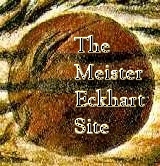|
|
||
 |
Meister Eckhart Home / Works by Meister Eckhart - Quotes / Inspired by Eckhart / Studies / The Papal Condemnation / Mail & Announcements / Links / Books |
A review of Simon Parke's book, "Conversations with Meister Eckhart"
Cf. S. Parke's Conversations with Meister Eckhart - at Amazon
*
Page 2
Now, let’s see in action this meeting, by observing two responses of Eckhart’s linked with a question-remark by Parke (pages 94 and 95).
Eckhart first emphasizes that in knowledge of God alone, beyond knowledge of oneself, beyond even the self-awareness that exists in a soul when she realizes that she knows God, the soul exists in the root of all blessedness.
After that (in the order that Parke has chosen for the responses of Eckhart) the Meister explains that simply knowing God alone, and the awareness of the self, even in the action of knowing God, belong to two different modes of being, the one proper to this life, and the other proper to the ‘other’ or blessed life. Simple knowledge of God, where the soul is absorbed in that knowledge, unable to say what it sees, feels or is, belongs to Godly perfection which lies in a simplicity out of which everything emanates, while self-awareness and all ‘multiple’ knowledge belongs to this life, where everything is composed by a nature which builds the one thing upon the other in order to reach perfection.
Parke’s task is to connect the two sayings, to invent a question or any type of remark that would lead from the first to the second of Eckhart’s sayings – in an ideal situation expressing the readers’ doubt or wonderment, making us long to hear the second of Eckhart’s sayings, the supposed answer to our own thirst for an explanation.
Let’s read the first saying, the ground of our question and of Eckhart’s answer to our question:
“Indeed, it is not ourselves and other things that we know, but rather God alone, if we rest in the root and ground of blessedness. But when the soul knows that she knows God, then she has knowledge simultaneously of God and of itself.”
We wonder, is it more satisfactory for the soul to stay in the “root” of blessedness, instead of going out to “all” blessedness? Can we speak of an ‘inferior’ and a ‘superior’ blessedness, if knowledge of God excludes knowledge of self or of anything else besides God? The Delphic oracle commanded that we “know ourselves” – does such a command lead to an inferior level of being?